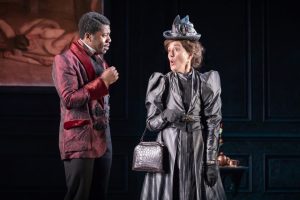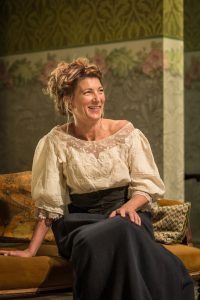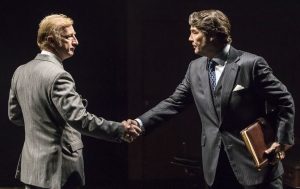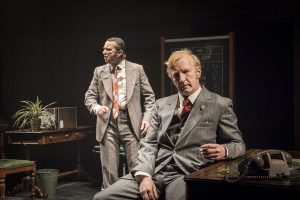Hilary Mantel and Ben Miles provide a fitting end to a great theatrical trilogy.
★★★★

It’s a few years since the Royal Shakespeare Company‘s outstanding stage versions of the first two books in Hilary Mantel‘s trilogy about the rise and fall of Thomas Cromwell. At last, we arrive at the final volume The Mirror And The Light. So did episode three reach new heights or fall from grace?
Just in case you don’t know your history or haven’t read the book, we begin with Cromwell in prison, his fate already sealed. We see who his enemies are and who among his allies has betrayed him.
The prison set is dark and foreboding with high steely grey walls, designed by Christopher Oram. Then we go back in time to when Cromwell was still riding high, and, with a jolt, we realise the court is almost identical to the prison.
Even the King is trapped by what is required of his position but the rest are prisoners to his whims, as well as constantly vulnerable to enemies in the court.
The story of Cromwell’s fall then plays out and is more, not less, tense for our knowing the fate that awaits him. This is not a simple adaptation of a novel. It is a gripping piece of theatre, as if writers Hilary Mantel and Ben Miles have taken the story of Cromwell and written a play about it from scratch.
So we’re not inside Cromwell’s head, as in the book, but rather witnessing this central character’s interaction with those around him, showing how others see him and how he works the court. We see the fragility of his power and his own awareness of his vulnerability.
Jeremy Herrin’s production feels Shakespearean
The play feels Shakespearean, and under Jeremy Herrin’s direction, it looks like a traditional production of one of the history plays, with everyone looking like they’ve stepped out of a painting by Hans Holbein. The language while not as poetic has an Elizabethan style, but also pace and a natural flow. The resemblance to modern day politics or even office politics is striking.
Cromwell, hated by his fellow councillors and by the people, is dependent on the goodwill of the King. British prime minister Harold Macmillan said the greatest challenge for politicians was ‘events, dear boy, events.’ So it proves for Cromwell. A mishandled northern rebellion, the death of Jane Seymour, a disastrous marriage to Anna of Cleves and the king begins to have less faith in his right-hand man. It’s all his enemies need, chief of which is the Duke of Norfolk, played by Nicholas Woodeson as a little weasel of a man, who resents the rise of a blacksmith’s boy above his ancient aristocratic family, and takes every opportunity to bring about his downfall.
Cromwell is always either on stage or being discussed. He is not exactly a good man, actually he’s a greedy manipulator, but he comes across as honourable, at least by the standards of the day, and compassionate, for example to Princess Mary, in a way that few of the others do.
Ben Miles and Nathaniel Parker head a well chosen cast
Ben Miles‘ performance as this complex man- laughing, worrying, macho, submissive- his eyes constantly flicking round the room- is a tour de force.
Both he and the King are lonely at the top. Nathaniel Parker’s Henry, the mirror and the light of the title, is a capricious child in an oversized man’s body, self indulgent, self pitying, isolated. A telling moment sees him by alone, feeling the cold, desperate for the warmth of the fire.
With a cast of 24, this Royal Shakespeare Company production has an epic feel. And it is a well chosen, diverse cast, who are a compliment to the RSC’s casting director Helena Palmer.
Melissa Allan reveals the steel in Mary Tudor. You can see Bloody Mary waiting to emerge. Geoffrey Lumb as Thomas Wriothesley and Leo Wan as Richard Riche make you recoil at their sliminess. Terrique Jarrett as Cromwell’s son Gregory adds a bright presence, and Jordan Kouamé was moving as Cromwell’s ally Rafe Sadler, desperate to save him without offending the King. Matthew Pidgeon’s double act as the friendly ambassador Eustache and the vicious Bishop Gardiner was impressive.
Inevitably death hangs over this evening. The two most influential people in Cromwell’s life appear as ghosts: his old mentor Cardinal Wolseley, played by a jolly Tony Turner, and his father, played with a spitting nastiness by Liam Smith.
I’m sorry if I’ve made the evening sound grim, it’s actually leavened with a great deal of humour. Paul Adeyefa brings much comedy as Cromwell’s faithful French servant Christophe. Nicholas Boulton is a Tigger-like Duke Of Suffolk, a friend to Cromwell in the sense of ‘with friends like these who needs enemies’. Jo Herbert is a cynical Lady Rochford. One of the funniest moments of the evening is when the new queen Jane Seymour, played as a likeable young woman by Olivia Marcus, complains to Cromwell about Henry’s unreasonable demands. An embarrassed Thomas, assuming them to be sexual, tries to coax more detail out of her, only to discover she is referring to the King wanting her to ride with him to inspect the fortifications at Dover.
After the rollercoaster of events leading to Cromwell’s arrest, the ending is downbeat. This is partly because Cromwell accepts his fate with dignity. Despite a dramatic beheading orchestrated by illusionist Ben Hart, it’s a climax that didn’t leave me quite as shocked or drained as I expected. Nevertheless the play is a fitting conclusion to a fine trilogy.
The Mirror And The Light is due to run at the Gielgud Theatre until 23 January 2022. Tickets from delfontmackintosh.co.uk
Click here to watch the video of this review on YouTube



